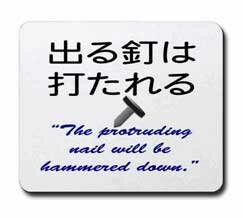
Departments
E d 's J a p a n e s e B l o g
(A r c h i v e s)
February 05, 2008
The Japanese language and Indian mathematics teachers
Japan may soon be hiring math teachers from India, and the Japanese language is a part of the plan:
When asked how the Japanese planned to tackle the language barrier, Yoshihiro Nishida, chairman of Yokohama Foreign Trade Association and co-chairman Yokohama India Centre Council, explained: "Mathematics is primarily a subject having its own unique numerical language. Just the basic knowledge of Japanese is enough for teaching purposes at the primary level."
Nishida revealed that they were seriously planning to introduce the Japanese language in India in a big way. "It will not only help iron out the psychological barrier, but also the language barrier if trade between the two countries has to flourish."
Read the complete article here..
New Japanese language center in Vietnam
As this article demonstrates, the Japanese language remains popular in Asia. By my observation, the Thais are the most enthusiastic Japanese language students in Asia; but interest in Japanese is growing in Vietnam as well.
VietNamNet Bridge - Deputy Prime Minister, Pham Gia Khiem has given a approval for the set up of a Japanese language training and cultural exchange center in the capital of Hanoi.
The center will be a place where Vietnamese people can come and research to learn about the land, culture and the people of Japan. There are around 30,000 Vietnamese people currently studying Japanese.Read the complete article here...
February 03, 2008
A teacher’s dedication to the contributions of Japanese-Americans during WWII
Strictly speaking, this is a not a language-related article, but I liked it and wanted it to share it with this site’s readers. Take a few minutes to check it out…
There are moments in our lives we only later realize for their bigger significance. Indiana teacher Leila Meyerratken ran smack into one a decade ago, when she began teaching about the Japanese language (continue....)
February 02, 2008
Wisconsin teacher comfortable in French and Japanese
For those of you who are studying with foreign language skills in general, or Japanese in particular: I think that it is always helpful to read stories about other native English speakers who have mastered foreign languages. (Especially if it happens to be an American---since we’re such notoriously lazy linguists.)
Here is a story about a Wisconsin teacher who has learned French as well as Japanese. She now teaches both languages.
Note what the article says about the unique motivation of students of 日本語:
Because Japanese involves learning three alphabets - two phonetic and one pictorial, which has more than 2,000 characters - Boston teaches those students at a slower pace than those learning one of the Romantic languages.
The pace surprises students, she said, but the kids in Japanese really want to learn it whereas some in the French classes take it because they need a foreign language credit.
January 29, 2008
New book available on Amazon: Falling in Love with Carp: Tips, Tricks, and Tongue Twisters for Remembering Japanese Words
page views online at Amazon....
Introduction:
Elephants, Belly Dancing, and Mnemonic Devices
I made it through the American educational system long before the days of standardized tests, when “enrichment” courses like music were still considered to be important. During my sixth grade year, my music teacher was an ambitious educator who decided that his class was going to be more than the run-of-the-mill “music appreciation” course. He set out to transform his class of unruly eleven-year-olds into budding musicians. This meant that we were going to learn how to play a real instrument.
The teacher selected an instrument called the recorder. The recorder isn’t used in any form of music that is popular today (nor indeed, in any music that was popular in my day); so perhaps I should give a brief description of it. The recorder is a simple woodwind instrument. It consists of a hollow wooden tube that has a mouthpiece at one end and a flared opening at the other. There is a series of holes on the middle section of the recorder. Music is made by blowing into the mouthpiece end of the recorder while blocking and unblocking different combinations of the holes with one’s fingertips. The recorder might be described as a poor man’s clarinet.
In order to learn how to play the recorder, we had to learn the bare rudiments of reading music. This began with the order of the treble clef: EGBDF.
This introduction to the treble clef also marked my first exposure to the concept of mnemonics. Since EGBDF does not follow the order of the alphabet, it is somewhat difficult to remember by rote memorization. It would be easy to include the wrong letters in the combination, or to forget the order of the letters. So our teacher taught us the standard mnemonic sentence used by generations of school children to remember EGBDF: Every Good Boy Does Fine.
Then he looked at us somewhat conspiratorially and gave us an alternative mnemonic: Elephants Go Belly Dancing on Friday. The class roared with laughter. (Hey, this was 1979. Kids were still easily amused in those days.) I laughed along with everyone else. I had an image of jiggling, gyrating cartoon elephants wearing grass skirts and bikini tops.
More importantly, though, the acronym EGBDF was forever seared into my mind. At the time of this writing, I have not touched a recorder or any sort of woodwind for nearly thirty years. But I still remember EGBDF as if that sixth grade music class were held yesterday.
Years later, I read Barry Farber’s seminal book about language learning, How to Learn Any Language. One of the chapters of the book covers a mnemonic technique known as Harry Lorayne's Magic Memory Aid. This technique involves building mnemonics around specific words.
Here is a commonly cited example of how vocabulary learning mnemonics work, using two easily confused English words: principle and principal.
“Remember that the principal is your pal.”
Looking back, I don’t think I would describe any of my school principals as my “pals”—but that is not the point. A pal is a fellow human. So is a principal. This link of commonality creates a logical association between the two. Remember the above sentence and you will never again confuse principle and principal.
This is a book of mnemonic devices for learning Japanese words, with a particular emphasis on homonyms that are easily confused. Since convenient similarities like “pal” and “principal” are rare in Japanese, I have had to expand the standard mnemonic format a bit. Most of these word associations are built around a parallel English sentence. Others are plays on the literal translations of particular words.
The book is organized into short segments by keyword heading, so you can proceed linearly from beginning to end, or thumb through the book while riding the subway or slurping down a bowl of noodles at a Japanese lunch counter. A keyword index is included at the end of the book.
January 26, 2008
Should Japanese language skills be a requirement for living in Japan?
The Japanese government has been taking a lot of heat over a new bill which would require long-term foreign residents to demonstrate proficiency in the Japanese language.
There are two sides to this one. On one hand, it simply makes sense for immigrants to learn the language of an adopted country. Without a grasp of the local language, it is difficult for them to fully participate in the society (not to mention earn a living).
On the other hand, I know that Japan does have a history of being somewhat exclusionary (especially where Asian immigrants are concerned.) However, the language requirement is not necessarily aimed at keeping foreigners out, as Bloomberg.com reports:
Japan's mulling of a language requirement may hint at preparations to accept -- rather than reject -- more migrants, said Hidenori Sakanaka, director of the Japan Immigration Policy Institute in Tokyo and formerly head of the Justice Ministry's Tokyo immigration office. Officials realize that Japan's aging society and pending labor shortage obliges them to boost immigration.
``I think this is a preparation for that,'' Sakanaka said. ``It's a global trend to require language ability for immigrants to integrate them into society.''
Japan's labor force will shrink to 55.8 million in 2030 from 66.6 million in 2006 if more women and the elderly aren't allowed to work, according to a labor ministry report.
``This shows that the government and business circles want to increase foreign workers,'' said Ippei Torii, secretary general of Solidarity Network with Migrants Japan, an advocacy group for foreign laborers in Tokyo.
January 23, 2008
Public trial for the wife of the ex-prime minister
There are charges of corruption in high places in Thailand. The ex-prime minister’s wife appeared in court and pleaded not guilty. She reported that her husband should return to Thailand in May to present himself in court. Read the complete article here.
タクシン夫人、汚職裁判で無罪を主張 前首相は5月帰国と
バンコク(CNN) タイのタクシン前首相のポチャマン夫人が汚職関連罪に問われている裁判の初公判が23日、当地の最高裁判所で開かれ、夫人は罪状認否で無罪を主張した。夫人が法廷で語ったところによると、タクシン前首相も5月までに帰国し、出廷する見通しだ。
Key vocabulary:
タイ Thailand
タクシン夫人 (タクシン ふじん)Mrs. Thaksin; Madame Thaksin
前首相 (ぜんしゅしょう) ex-prime minister
汚職 (おしょく) corruption
関連(かんれん)related
罪(つみ)crime
Xに問われている (X に とわれて いる) to be charged with X; suspected of X
裁判 (さいばん) court
初(はつ)first-
公判 (こうはん)public trial
当地の (とうち の) of this place
罪状認否で無罪を主張する (ざいじょう にんぴ で むざい を しゅちょう する) to plead not guilty
法廷で (ほうてい で)at court
語る (かたる) to tell; to relate
帰国する (きこく する)to return to one’s own country
出廷する (しゅってい する) to appear in court
見通し(みとおし)expectation; forecast
January 21, 2008
The Bush anti-recession plan
Last week the Bush Administration unveiled it plan for coping with the looming recession. Read the complete article here.
景気対策、15兆円規模に・米大統領が表明、減税が柱 ブッシュ米大統領は18日、検討中の景気刺激策の規模が米国の国内総生産の1%程度(約15兆円)になることを明らかにした。
Key Vocabulary:
景気 (けいき) economy; economic conditions
対策 (たいさく) countermeasure
15兆円 (じゅうごちょうえん) 15 trillion yen
規模 (きぼ) scope, scale
米大統領 (べい だいとうりょう) U.S. President
減税 (げんぜい) tax reductions
柱 (はしら) pillar; mainstay
検討中の (けんとうちゅう の) under consideration
景気刺激策 (けいき しげき さく) economic stimulus plan
米国の国内総生産 (べいこく の こくない そうせいさん) U.S. GDP
程度 (ていど) degree
January 19, 2008
My new podcast series: Languages in the News
Not just Japanese, but it might be of interest to those of you have a more general interest in languages. Listen here...
January 17, 2008
You Tube Japanese by Example from yours truly....
January 14, 2008
Making videogame development more efficient
The keyword in the article excerpted below is効率化する(こうりつか する), which means “to make more efficient.” Read the complete article here.
ゲーム開発を効率化する「コンテンツパイプライン」・GDC08を読む 2月18日から22日に米サンフランシスコで開催される世界最大のゲーム開発者向けコンファレンス「ゲーム開発者会議(GDC)08」の概要が明らかになりつつある。発表になっている400あまりの講演のタイトルから伺える今年の論点は、「新ハードに向けたコンテンツパイプラインの設計の方法論」と、「AIとデータの自動生成の新しい技術の応用」、「ユーザー・クリエイト・コンテンツ・サービスを含んだ新しいサービス」といったところに集約化できそうだ。
Supplementary vocabulary:
ゲーム開発(ゲーム かいはつ) game development
読む(よむ) to read
開催される(かいさい される)to open (a meeting; conference)
世界最大の (せかい さいだい の) the largest in the world
ゲーム開発者向け (ゲーム かいはつしゃ むけ) oriented to game developers
概要 (がいよう) summary; outline
講演 (こうえん) speech
伺える (うかがえる) can inquire
今年の論点 (ことし の ろんてん)this year’s point at issue
新― (しん-) new-
設計の方法論 (せっけい の ほうほうろん)theories about design
自動生成の (じどう せいせい の) automatically generating, self-generating
新しい技術の応用 (あたらしい ぎじゅつ の おうよう)the application of new techniques
集約化 (しゅうやくか)concentration; intensification
January 11, 2008
New Everything Japanese Guide video
January 06, 2008
A nice story about a gaijin in Japan
A few months ago there was a spate of negative stories about foreigners who took a financial beating when the Nova Corporation went belly-up.
Here is a story to balance those out, a young woman from Bluffton, Indiana who is apparently having a good time teaching English in Japan.
If you are on the fence about going after the Nova debacle, this story will inspire you to head for Japan…
Aussie success in Japan
And here is an extremely worthwhile article about the triumphs of some Australians in building non-English-teaching careers and businesses in Japan. Note that Japanese language skills are a major factor in their high rate of success:
A surprising number of Australians have built businesses from the ground in Japan.
Among the larger expatriate nationalities, they have uncommonly high average language skills, the result of more than three decades of emphasis on Japanese-language studies inAustralian schools and universities.
"That's an advantage we've had for a while," Synovate Healthcare Japan president Bill Hall says.
About to become head of the group's business consulting in Japan, Hall says his compatriots would do well not to let their advantage slip.
"There is a shift in Australian interest towards China and India but we cannot ignore Japan, it still remains the world's second-largest economy and will continue to be the second-largest economy for a long time yet."
Let this inspire you to persevere in your Japanese language studies.




